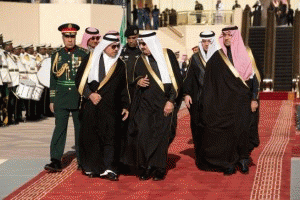Reprinted from Consortium News

King Salman of Saudi Arabia and his entourage arrive to greet President Barack Obama and First Lady Michelle Obama at King Khalid International Airport in Riyadh, Saudi Arabia, Jan. 27, 2015.
(Image by (Official White House Photo by Pete Souza)) Details DMCA
The term "proxy war" has experienced a new popularity in stories on the Middle East. Various news sources began using the term to describe the conflict in Yemen immediately, as if on cue, after Saudi Arabia launched its bombing campaign against Houthi targets in Yemen on March 25.
"The Yemen Conflict Devolves into Proxy War," The Wall Street Journal headlined the following day. "Who's fighting whom in Yemen's proxy war?" a blogger for Reuters asked on March 27. And on the same day the Journal pronounced Yemen a proxy war, NBC News declared that the entire Middle East was now engulfed in a proxy war between Iran and Saudi Arabia.
The real problem of proxy war must begin with the fact that the United States and its NATO allies opened the floodgates for regional proxy wars by the two major wars for regime change in Iraq and Libya. Those two profoundly destabilizing wars provided obvious opportunities and motives for Sunni states across the Middle East to pursue their own sectarian and political power objectives through proxy war.
Prominent Twentieth Century political scientist Karl Deutsch defined "proxy war" as "an international conflict between two foreign powers, fought out on the soil of a third country, disguised as a conflict over an internal issue of the country and using some of that country's manpower, resources and territory as a means of achieving preponderantly foreign goals and foreign strategies".
Deutsch's definition makes it clear that proxy war involves the use of another country's fighters rather than the direct use of force by the foreign power or powers. So it is obvious that the Saudi bombing in Yemen, which has killed mostly civilians and used cluster bombs that have been outlawed by much of the world, is no proxy war but a straightforward external military aggression.
The fact that the news media began labeling Yemen a proxy war in response to the Saudi bombing strongly suggests that the term was a way of softening the harsh reality of Saudi aggression.
The assumption underlying that application of "proxy war" is, of course, that Iran had already turned Yemen into such a war by its support for the Houthis. But it ignores the crucial question of whether the Houthis had been carrying out "preponderantly foreign goals and foreign strategies." Although Iran has certainly had ties with the Houthis, the Saudi propaganda line that the Houthis have long been Iranian proxies is not supported by the evidence.
Far from proving the Iranian proxy argument, the Houthi takeover of Sanaa last year has actually provided definitive evidence to the contrary. U.S. intelligence sources recently told the Huffington Post that before the Houthis entered the capital, the Iranians had advised against such a move, but that the Houthis ignored that advice.
Gabriele vom Bruck, a leading academic specialist on Yemen at the School of Oriental and African Studies, said in an e-mail to this writer that senior Yemeni officials with links to intelligence had told her the same thing weeks before the story was leaked.
The Houthis rejected the Iranian caution, vom Bruck believes, because former President Ali Abdullah Saleh and his son Ahmed Ali Saleh (the former commander of the Republican Guard) had indicated to them that troops that were still loyal to them would not resist the Houthi units advancing on the capital unless the Houthis attacked them.
So the Houthis clearly don't intend to serve an Iranian strategy for Yemen. "Certainly the Houthis do not want to replace the Saudis with the Iranians," says vom Bruck, even though they still employ slogans borrowed from Iran.
Regional Proxy War?The NBC story on a "regional proxy war" completely misses the seriousness of the problem. It turns its proxy war concept into an abstract and virtually antiseptic problem of limiting Iranian influence in the region through the U.S. bombing Iraq. It ignores the fact that the regional actors behind the wars in Syria, Iraq and Libya are pulling the region into a new era of unbridled sectarian violence and instability.
The crimes committed by the Syrian regime in the war are unconscionable, but the policies of external countries pursuing a proxy war to overthrow the existing regime have created a far more ominous threat to the entire region.
Washington Post columnist David Ignatius has detailed the process by which Turkey, Saudi Arabia and Qatar competed with one another to create proxy forces with which to overthrow the Assad regime.
Such an unbridled competition in the creation of armies for regime change was by its very essence a reckless and cynical use of power that carried the obvious risk of even worse chaos and violence of the war in Syria. But they have made the costs of proxy war far greater by targeting the most aggressive armed groups they could find as their clients, and their weapons soon "made their way to the terrorist groups," wrote Ignatius, to which the Turks and Qataris "turned a blind eye."
(Note: You can view every article as one long page if you sign up as an Advocate Member, or higher).





